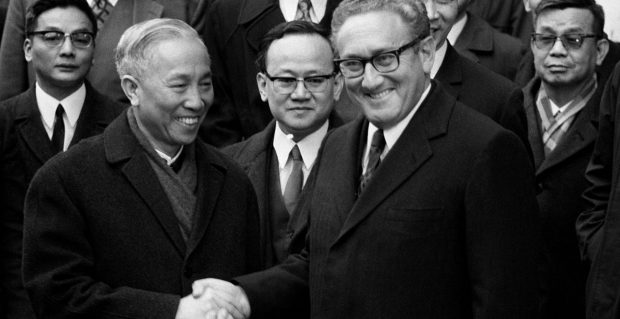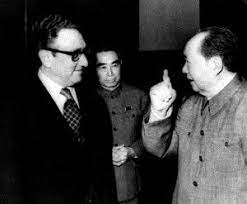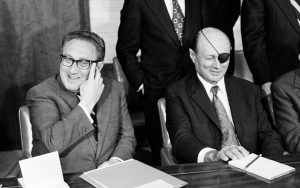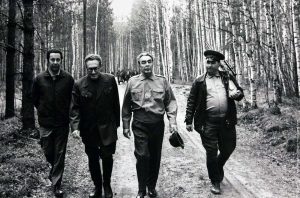The Modern Metternich

Henry Kissinger (27 May,1923 to 29 November, 2023)
Like Klemens Metternich, he’d been a refugee, entered into the realm of international diplomacy early on, and took a realist, conservative view of world order, based on the equilibrium of power and interests. Always a ‘foreigner’ in his adopted country, one could impute to him, after Metternich, the line: “I governed the World sometimes, America never.”
Kissinger became a bête noire of the left: for example, Christopher Hitchens wrote an incendiary polemic about him, declaring him guilty of war crimes. One doubts not that Henry cringed when remembering the coup in Chile, the Indonesian incursion into East Timor, or the Pakistan military in Bangladesh (Dick and Henry needing the Pakistanis to give HK a discreet ride to China). The charges against him on these events are unconvincing. But then there’s the bombing of Cambodia and Laos.
What has to be understood is that Kissinger was a public servant, advising two Presidents occupied with a Cold War that posed an existential threat to the World. The domino theory was real. All of the obloquy has to be seen through that prism. And HK was much more successful in attaining peace than fomenting war. He (and Nixon) reached a peace with honour in Vietnam (which only collapsed after the demise of Nixon and via Congressional apathy in 1975); he stifled war in the Middle East and helped stabilise it; he paved the way to end the Cold War through strategic arms limitation deals and détente with the Soviets, and splitting the illusion of a Communist monolith by reaching out to isolated China.
Here are some thoughts about HAK, and by the man himself:
“He is a European and he has a view of the world that a born American could not have.” [Ralph Blumenfeld, Henry Kissinger, The Private and Public Story (1974)]
“Napoleon once said of Metternich that he confused policy with intrigue. Kissinger was a master of both, and as with Metternich, his policies reflected the complexities of his personality….Kissinger believed, with some justification, that in order to establish subtle linkages and calibrate delicate balances, he had to keep tight control over various strands of policy through back-channel machinations…he felt he could better negotiate an opening to China if he kept the State Department in the dark, that he could more easily reach a settlement in Vietnam if he kept President Thieu uninformed, and that he could piece together an arms control accord if he circumvented Gerard Smith and his SALT experts.” [Walter Isaacson, Kissinger (1992)]
“[Secretary of State] Rogers felt that Kissinger was Machiavellian, deceitful, egotistical, arrogant, and insulting. Kissinger felt that Rogers was vain, uninformed, unable to keep a secret, and hopelessly dominated by the State Department bureaucracy…Kissinger suggested repeatedly that he might have to resign unless Rogers was restrained or replaced.” [Richard Nixon, Memoirs (1978)]
“A good liar must have a good memory: Kissinger is a stupendous liar with a remarkable memory.” [Christopher Hitchens, The Trial of Henry Kissinger (2001)]
“A 40 Committee [for covert operations] was set up for October 6, and Kissinger once again dominated. Minutes of that meeting, as later published in part by the Senate Intelligence Committee, quote Kissinger as caustically criticizing those who “presumed total acceptance of a fait accompli” – that is, the election of Allende…” [Seymour M. Hirsch, The Price of Power (1983)]
“We knew Henry as the “hawk of hawks” in the Oval office. But in the evenings, a magical transformation took place. Touching glasses at a party with his liberal friends, the belligerent Kissinger would suddenly become a dove – according to the reports that reached Nixon. And the press, beguiled by Henry’s charm and humor, bought it.” [H. R. Haldeman, The Ends of Power (1978)]
“To his subordinates, he was a slave driver. To those few who could stand the gaff over a period of time, he built an admirable loyalty, but he also produced a well-strewn wayside with those who could not, or who were shocked to discover that his policy position was more hard-line Nixonian than they had expected. Watching Kissinger with his staff made one add a note of caution to an assessment: he was endearing only when he wanted to be and caused even those who were most attracted to him to wonder whether he was more respectful of position than personality.” [William Safire, Before the Fall (1975)] (Henry Arse-Kissinger? – Ed.)
“In the end, the Nixon-Kissinger relationship was one of or possibly the most significant White House collaboration in U.S. history. Their mutual interest in and knowledge of the world translated into some impressive achievements. But their shared affinity for exclusive control of foreign policy combined with their misjudgments on Vietnam, Cambodia, Chile, and South Asia also produced notable failures.” [Robert Dallek, Nixon and Kissinger (2007)]
“When Kissinger traveled, he did not leave the State Department behind. He took it with him. There was no problem about who was going to mind the store. Kissinger was the store. He didn’t deputize. He traumatized. (It was not surprising that when he was asked during a three-hour NBC special on foreign affairs if anybody “really knew how foreign policy was made,” he replied with a wry smile, “I do.”) [Richard Valeriani, Travels With Henry (1979)]
“His arguments for his brand of realism – thinking in terms of national interest and a balance of power – offer the possibility of rationality, coherence and a necessary long-term perspective at a time when all three of these qualities seem to be in short supply.” [Barry Gewen, The Inevitability of Tragedy: Henry Kissinger and His World (2020)]
[In 1973, when several Arab nations launched a surprise attack on Israel on Yom Kippur, the Day of Atonement, Kissinger moved heaven and earth to resolve the situation without escalation to a general war, including shuttle diplomacy and a game of ‘chicken’ with the aggressors’ patron, the USSR, that included placing U.S. forces on Defcon 3, the highest peacetime alert. It averted war and effectively diminished Soviet influence in the Middle-East.] “…Brezhnev brought calm and good sense to that critical Politburo meeting…Would historians of the future deem this to have been his finest hour? Or Kissinger’s, playing a consummate poker hand?…Perhaps, whatever else might be thought of Kissinger around that Moscow table, some element of the trust instilled by détente might be detected in Brezhnev’s response?” [Alistair Horne, Kissinger: 1973, The Crucial Year (2009)]“For Nixon, the world was divided between friends and antagonists; between arenas for cooperation and those in which interests clashed. In Nixon’s perception, peace and harmony were not the natural order of things but temporary oases in a perilous world where stability could only be preserved by vigilant effort.” [Kissinger, Diplomacy (1994)]
“Oversimplification tempts the United States into simultaneous overextension and abdication, into seeking to impose its views of appropriate domestic structures by sanctions and pressure or else to invoke the alleged moral shortcomings of potential partners as an alibi for isolationism.” [Kissinger, Years of Renewal (1999)]
“In his essay “Perpetual Peace,” the philosopher Immanuel Kant argued that perpetual peace would eventually come to the world in one of two ways: by human insight or by conflicts and catastrophes of a magnitude that left humanity no other choice. We are at such a juncture.” [Kissinger, On China (2011)]
[The Nobel Peace Prize is, of course, a joke, but always a richly entertaining one. After Kissinger and Le Duc Tho (see main image) ‘shared’ the 1973 prize, Tom Lehrer called it ‘the death of parody.’ Walter Isaacson (op cit.) describes a Paris meeting of laureates in 1988, where 1980 laureate Adolfo Esquivel accused Kissinger of “genocide and collective massacre” – the kind of acid now being hurled at the State of Israel. Isaacson describes HAK’s reply]: “More than a dozen of his relatives had been killed in the Holocaust, he said, so he knew something of the nature of genocide. It was easy for human rights crusaders and peace activists to insist on perfection in this world. But the policymaker who has to deal with reality learns to seek the best that can be achieved rather than the best that can be imagined…Those with true responsibility for peace, unlike those on the sidelines, cannot afford pure idealism. They must have the courage to deal with ambiguities and accommodations, to realize that great goals can be achieved only in imperfect steps.”
Leave a comment...
While your email address is required to post a comment, it will NOT be published.





0 Comments